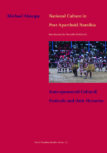National Culture in Post-Apartheid Namibia. State-sponsored Cultural Festivals and their Histories
- Language: English
- 200 pages
- Illustrations, maps, tables, index
- Vol. 15
- ISSN: 2234-9561
- ISBN:
- Print: 978-3-905758-42-9
- PDF: 978-3-905758-69-6
National Culture in Post-Apartheid Namibia. State-sponsored Cultural Festivals and their Histories
‘National Culture in Post-Apartheid Namibia‘ addresses the challenges of creating a ‘national’ culture in the context of a historical legacy that has emphasised ethnic diversity. The state sponsored Annual National Culture Festival (ANCF) focuses on the Kavango region in north-eastern Namibia. Akuupa critically examines the notion of Kavango-ness as a colonial construct and its subequent reconsitution and appropriation. He analyses the way in which cultural representations are produced by local people in the postcolonial African context of nation building and national reconciliation by bringing visions of cosmopolitanism and modernity into critical dialogue with the colonial past.
Michael Akuupa obtained his PhD from the University of the Western Cape for this study. He is an active researcher in Namibia and lectures in Anthropology at the University of the Western Cape.
Foreword by Meredith McKittrick
1 The Festive ‘Moment’ of Namibia
2 The ‘Performance’ of Culture
3 Home Anthropology and Politics of Ekoro
4 Kavango the ‘Domicile’ in Perspective
5 Sangfees, the Antecedent of the Postcolonial Annual National Culture Festival
6 Kavango Cultural Identity in Postcolonial Namibia
7 Namibian Identity Through Dance
8 Deconstructing Postcolonial Ethnic Diversity
9 The Postcolonial Nation as Curated by the State Through Dance
Appendix
“In his careful attention to local relations of power, Akuupa places himself firmly in a branch of Namibian studies that focuses on the role of local people in shaping large historical processes such as colonial rule, labor migration, and Christianization. He shows us how the content of festival performances is continually policed by spectators, participants, and judges for “external” and polluting influences. Culture thus sits in opposition to modernity. But it is also given ownership: culture, Akuupa perceptively notes, is always someone’s. This fact allows local people to claim authority and authorship, and to legitimate their actions on the basis of a perceived continuity with the past.”
Meredith McKittrick, Georgetown University, Washington, D.C.

